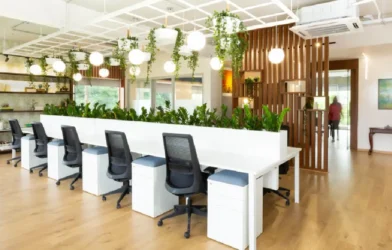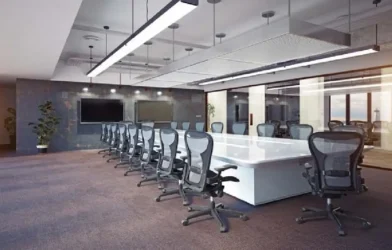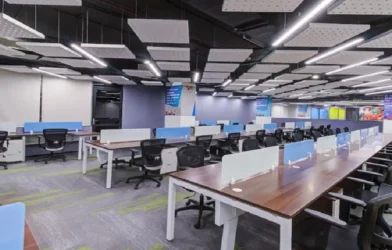Subtotal ₹0.00
Can Covid-19 be called the disruptor of the Real Estate Business as we look at it now? Yes, very much so. Pandemics or disrupting events have happened many times in history. 15 to 25% of the population of different zones/countries was wiped out many times due to pandemics/wars e.g. Bubonic Plagues, Bengal famine in 1768-70, Spanish Flu, WWII, etc.
within the last 500 years. But every time, the world bounced back and came out even stronger than before, proving that the human race is resilient, and its memory is short. Even after 9/11, people said that they would stop Air Travel but started travelling soon after.
However, in these times things are different – which might cause a seismic shift in Commercial Real Estate. The World has new facilities & tools available i.e. going digital and working from the safer environment of Homes. There were some challenges associated with working from home before this pandemic happened:
1. Employers have always wanted their staff to come and work from the office, based on the long-living assumption that productivity is better managed under close physician supervision. I said ‘assumption’ because in my view, coming to the office means no guarantee of productivity.
2. Work From Home (WFH) policies remain underdeveloped for the reasons outlined above and also a stark 20th Century need for a hand-shake and face-to-face interaction (as if work or deals cannot be done with it).
3. Confidentiality & protection of data if the company employees are to work from home.
4. Development of emotional connection & team spirit among employees and between employees and the employer; also, to avoid corporate isolation.
5. Employees have a problem articulating communication with colleagues and seniors, especially in India, over email, etc. whereas face-to-face verbal communication is easier.
6. Organisations becoming more vulnerable to cybersecurity threats with employees accessing employer networks while working from home.
7. Employees need to make some changes/adjustments in their homes to make at least one room/space conducive for WFH so that they can work without any disturbance.
8. Cultural shift is required in many senses.
But now we are seeing major changes in the way people are thinking:
” In a matter of weeks, the lives of so many have changed in ways they had never imagined. People can no longer meet, work, eat, shop, and socialize as they used to. The working world moved rapidly from business-as-usual to cautious travel, office closures, and work-from-home mandates.
Instead of travelling and going out to eat at restaurants, consumers across the world are tightening their purse strings to spend only on essentials—primarily food, medicine, and home supplies—and getting these delivered much more often.” (Downloadable Resources Open Interactive Group-Article (PDF-501B)-McKinsey)
Before we deliberate the future of Commercial Real Estate, let us see some of the benefits of WFH:
1. Employers are suddenly excited by the WFH concept as if they were waiting for some opportunity to work toward this and for good reasons, including but not limited to cost savings.
2. Employers are already working on productivity and confidentiality issues in WFH. (“Productivity – if things continue for a bit longer, companies will want to survive innovatively. Innovation in measuring the productivity of working from home, especially in the services industry, may pick up allowing firms or organisations to truly leverage work from home at high efficiencies.
This could be in the form of wearable or auto/manual time tagging on laptops and phones. This will create a whole new normal.”- Arushi Chopra-UK Based Strategy Consultant).
(“Data protection, Cybersecurity & confidentiality – organizations have fired up access to corporate/business data from home and that is exposing organization networks to threats. Enabling organizations to securely work from home and be able to get access to their work applications from personal laptops/desktops is here to stay.
Security policies of the organization should be applied while accessing business applications on personal laptops through the cloud. This offering is available through IT companies at reasonable prices.”-Arushi Chopra-UK Based Strategy Consultant)
3. Extreme acceleration of Digital facilities (High-Speed WiFi, large Monitors, Zoom, Hangout, and WhatsApp kind of apps) to have face-to-face interaction at your will. There will be a resultant tectonic effect on the Digital Economy. As per the recent news, Facebook is investing $6.3B for a 9.9% share in Reliance Jio, valuing Jio at $65B.
4. Employees will be willing to go the extra mile to make WFH a success & resolve all its issues as there is a huge advantage in WFH, especially in the case of both working parents. (“For individuals, health and safety will become no. 1 on people’s agenda from the 3rd/4th place.” Webinar by IMF, Chaired by RRR).
5. Special mention of not having to eat out every day, instead of having home food! Further, not to worry about impeccable dressing, matching shoes, etc. every day for going to the office.
6. Save travel time & associated costs.
7. Employees will save a lot of money because of all the above advantages.
8. Less traffic on road resulting in saving on car parking spaces and Oil energy which the world is so deficient in.
9. Resultant cleaner environment & less pollution.
If you have reached this far reading my blog, you might have assumed that it is a certain doomsday for Commercial Real Estate. However, such a scenario is far from the truth. WFH option will certainly disrupt Commercial Real Estate, Covid-19 being a catalyst in my opinion. But let us first see the main types of Commercial Real Estates assets and how the social distancing norms would affect each of these:
1. Service Industry office spaces such as IT & IT Enabled Services, Professionals i.e. Business Consulting Firms, Accountancy Firms, Designers, Architects, Engineers, etc.
2. Corporate & Branch offices of the Business Houses/Companies, Co-working Spaces
3. Malls, Cinema Halls, food courts
4. Open Markets and fine dining restaurants
5. Online e-commerce retailers e.g. Amazon, Walmart, Cloud kitchens etc.
6. Warehousing Facilities etc.
7. Data Centres
If one looks at the above list, No. 1 i.e. Service Industry & Professional offices will certainly be affected with demand decreasing rapidly in the short-term. Even after the medicine/vaccine/cure has been found for COVID-19, the demand per annum will decrease from what it is now. This is simply because WFH might prove to be better for the reasons stated above. Having said that, the demand will not vanish.
“We are exploring to allow 25% workforce to WFH and will also look at dividing the balance 75% employees into two shifts to maximize physical distancing while they are at work”- C. P. Gurnani, CEO of Tech Mahindra, one of the top IT companies of India.
“In RBL Bank’s corporate office, it is found that it is enough that only 30% of staff stay in the office. Others can be connected from homes. This leads to lesser commute expense, the stress of the commute, time wasted, etc.- Webinar by IMF, Chaired by RRR”
This will mean that commercial space requirements should come down to about 1/3rd compared to the current requirement. However, this much reduction would not be possible because of new norms and building regulations that might be desired or enforced by the amended building codes.
“For example, within commercial office space, the multi-year trend toward densification and open-plan layouts may reverse sharply. Public health officials may increasingly amend building codes to limit the risk of future pandemics, potentially affecting standards for HVAC, square footage per person, and amount of enclosed space.” (Downloadable Resources-Open Interactive Group-Article (PDF-501B)-McKinsey)
With new design norms/regulations & an increase in the Digital Economy and therefore increased employee strengths, I believe that the space released now will be filled in the next 2/3 years after the pandemic is controlled.
Other asset classes might not be hit in terms of the annual demand in the long term though, in the short term, everything would be affected. In fact, due to the fast-increasing pace of e-commerce, the demand for Real Estate Asset classes such as the warehousing of goods and Data storage for e-commerce retailers, etc. might increase rapidly.
The Real Estate Asset classes of Corporate offices, Co-working spaces, Malls, Cinemas, open markets and restaurants etc. will remain stagnant with the possibility of many of the establishments shutting down in the short term. However, in my view, once the world bounces back, the demand should come back. “Humans is a social animal” and cannot live without socializing or entertainment. Should we expect changes in the way we are used to these shopping and recreational spaces, in terms of design or usage, certainly yes but that is a matter of detailed norms/regulations and designs.
In summary, my suggestions to the asset owners and real estate developers are:
i. Owners/Investors should hold on to their A-Class assets (B-class will be increasingly difficult to lease) and improve them to accommodate changes required for pandemics. Real Estate Developers should slow down the construction of IT/Service Industry oriented office spaces and release the constructed space as per the demand. They will also need to incorporate many design elements e.g. decrease physical touchpoints etc.
ii. Malls, Cinemas, open markets, etc. should be on a wait-and-watch scenario. We will know Human behaviour soon after the world has any control over Covid-19. Investors might like to look for good but distressed assets depending upon their risk appetite as many distressed assets are likely to come on the market.
iii. There might be an ever-increasing demand for the assets that are going to be used for E-commerce e.g. warehousing, data centres etc. Real Estate developers and investors should be on the lookout for good assets/opportunities in these areas.














